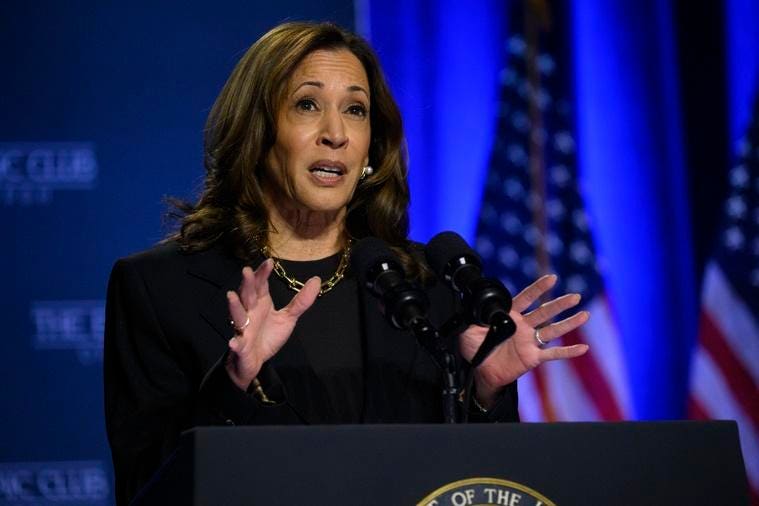On Wednesday, Vice President Kamala Harris and Governor Tim Walz unveiled their New Way Forward plan, which offers their economic vision for the country. During a speech in Pittsburgh, the Vice President proclaimed, “Look, I am a capitalist. I believe in free and fair markets. I believe in consistent and transparent rules of the road to create a stable business environment.”
The policy proposals are designed to create opportunities for both small and large businesses, lower costs, stimulate innovation, and invest in the workforce. It is also important to note that Vice President Harris’ plan also clearly embraces a belief in the power of the free market.
Vice President Harris’ plan prioritizes the ingenuity and perseverance of all Americans and lays the groundwork for an economy that rewards ambition, hard work, and innovation. Here are five reasons why her policies are rooted in capitalism in expanding opportunity and driving growth.
1. Supporting Entrepreneurs from the Ground Up
Earlier this month, Vice President Harris unveiled some of her small business policy proposals in the New Way Forward plan, including setting a goal of 25 million new small-business applications during her first term. One way she plans to achieve this milestone is by increasing the tax deduction from business start-up expenses from $5,000 to $50,000 for new small businesses. It takes on average about $40,000 to launch a small business for items that include market surveys, advertisements, equipment, and salaries for workers in training. This 10-fold increase in the deduction amount will allow them to cover more of these costs and provide more flexibility on when and how they can claim it. Small businesses account for the majority of net new job creation so supporting entrepreneurs from the ground up is a fundamental capitalist value.
2. Fostering Competition
Capitalism depends on fair competition to keep prices fair and drive innovation. Vice President Harris’s plan promotes this by breaking up price-gouging schemes in certain industries to lower grocery, health care, and energy costs, as well as protect consumers from hidden fees and fraud. This increased purchasing power can boost overall market demand and allow small and medium-sized businesses to compete on a level playing field.
3. Investing in Innovation
Competition also requires innovation and as the plan states, “American manufacturing is essential to rebuilding the middle class. Disinvestment in manufacturing communities, policy choices that facilitated outsourcing, and corporate decisions to deprioritize long-term supply chain resilience hollowed out American manufacturing leading the U.S. share of global manufacturing to decline from 25% in 1997 to 17% in 2021.” While the Biden–Harris Administration’s Investing in America Agenda has taken steps to reverse this course, Vice President Harris’ plan is designed to go further. It proposes investments in industries that are vital to the country’s future, such as AI, modernizing and reducing emissions in steel and iron production, and developing biotechnology for producing critical medicines and sustainable materials. This can help build up American industrial strength and create more jobs in communities across the country.
4. Strengthening Supply Chain Resilience
Covid-19 showed that you can be a capitalist, but if the supply chains are weak, you still may not be able to find toilet paper. Vice President Harris’s plan invests in strengthening supply chains for food, pharmaceuticals, and other critical sectors by making them more diverse and competitive with local suppliers and small businesses. This can not only drive down prices, but make the market function more efficiently with fewer disruptions.
5. Promoting Homeownership and Wealth Creation
A cornerstone of capitalism is the ability to build personal wealth, and the New Way Forward plan prioritizes this by expanding homeownership opportunities. It proposes building 3 million additional affordable homes and offering down-payment assistance of up to $25,000 for first-time buyers. In turn, a strengthened housing market can lead to more stable communities, helping ensure that businesses can retain talent and reduce the financial pressure on employees.
Perhaps most importantly, the numbers also indicate that Vice President Harris embraces the core tenets of capitalism: entrepreneurship, competition, access to capital, market efficiency, and wealth creation. The global investment bank Goldman Sachs, which is run by capitalists, estimates the bigger boost to the U.S. economy will happen if Vice President Harris is elected over her opponent. In addition, Moody’s Analytics projects that more than a million new jobs would be added to the economy and household disposable income would increase if she wins in November. This may be why nearly 100 business leaders and more than 400 economists are supporting her candidacy.
Read the full article here

